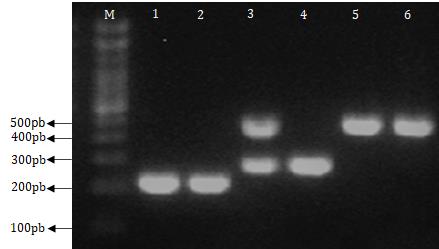Detection of β-lactamase, blaZ and mecA in penicillin-resistant Staphylococcus aureus isolated from bovine mastitis in Garanhuns, Brazil
DOI :
https://doi.org/10.21708/avb.2021.15.2.9611Résumé
There are few reports in the literature about genetic determinants of resistance to β-lactams in Staphylococcus aureus isolated from dairy cattle located in the municipality of Garanhuns, state of Pernambuco, Brazil. Thus, this study aimed to investigate the production of β-lactamase and the presence of the blaZ and mecA genes in penicillin-resistant S. aureus isolated from cases of subclinical bovine mastitis in the city of Garanhuns. Forty-six strains of penicillin-resistant S. aureus were evaluated using the nitrocefin disc test and duplex PCR. The results revealed that 45 strains (97.8%) were positive for β-lactamase production and 44 (95.7%) carried the blaZ gene. Among the latter, 43 (97.7%) were β-lactamase producers and only one (2.3%) was not. The mecA gene was not detected in any of the isolates investigated. The results suggest that enzymatic inactivation is the main β-lactam resistance mechanism expressed by S. aureus in the herds analyzed.
Téléchargements

Téléchargements
Publié-e
Numéro
Rubrique
Licence
Autores que publicam na Acta Veterinaria Brasilica concordam com os seguintes termos: a) Autores mantém os direitos autorais e concedem à revista o direito de primeira publicação, com o trabalho simultaneamente licenciado sob a Licença Creative Commons Attribution que permite o compartilhamento do trabalho com reconhecimento da autoria e publicação inicial nesta revista. b) Autores têm autorização para assumir contratos adicionais separadamente, para distribuição não-exclusiva da versão do trabalho publicada nesta revista (ex.: publicar em repositório institucional ou como capítulo de livro), com reconhecimento de autoria e publicação inicial nesta revista. c) Autores têm permissão e são estimulados a publicar e distribuir seu trabalho online (ex.: em repositórios institucionais ou na sua página pessoal) a qualquer ponto antes ou durante o processo editorial, já que isso pode gerar alterações produtivas, bem como aumentar o impacto e a citação do trabalho publicado (Veja O Efeito do Acesso Livre).


 Esta obra está licenciada com uma Licença
Esta obra está licenciada com uma Licença 